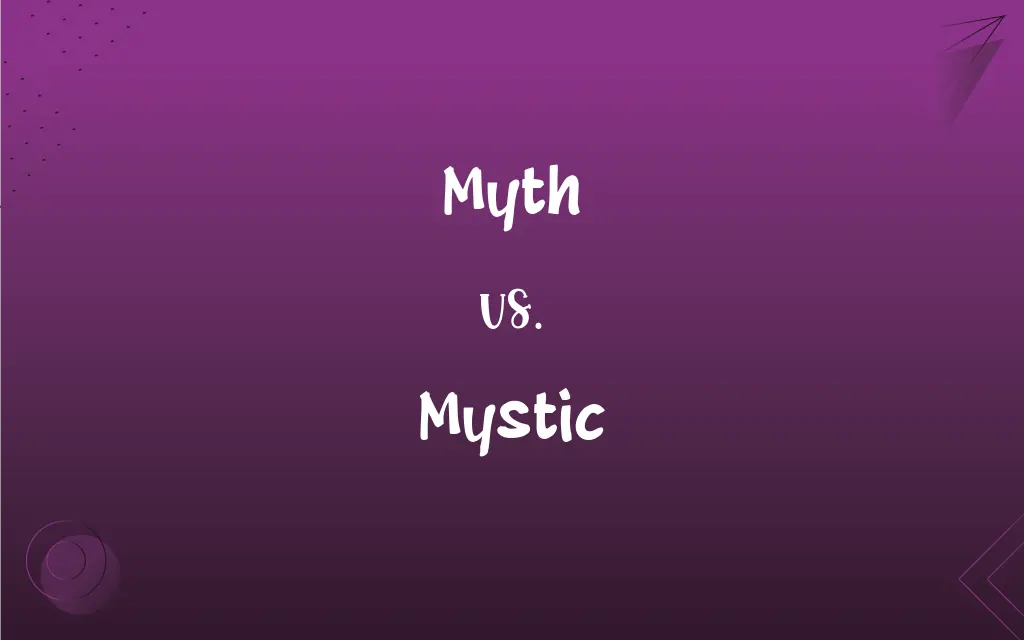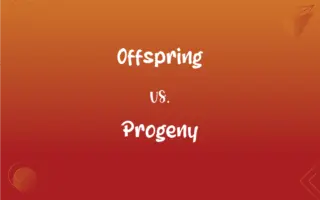Myth vs. Mystic: What's the Difference?
Edited by Aimie Carlson || By Janet White || Updated on November 14, 2023
A myth is a traditional story, especially one concerning the early history of a people or explaining a natural or social phenomenon, while a mystic is a person who seeks spiritual truths, often through meditation or contemplation.

Key Differences
A myth is often a narrative from ancient cultures used to explain natural events, deities, and cultural beliefs. In contrast, a mystic is an individual who pursues deeper spiritual understanding, often through introspective and transcendental practices.
Myths are integral to human cultures, conveying moral lessons, historical accounts, or creation stories. Mystics, on the other hand, are individuals who delve into the mysteries of the universe, life, and spirituality, seeking a direct connection with the divine or the ultimate truth.
While a myth is a story or a set of beliefs that may or may not be based on factual events, a mystic emphasizes personal spiritual experiences that transcend ordinary understanding.
Myths are typically shared orally or in written form, becoming a part of a culture's heritage. Mystics often share their insights through teachings, writings, or as spiritual guides, contributing to religious or philosophical thought.
In essence, a myth is a narrative tool, whereas a mystic is an individual pursuing and embodying spiritual experiences.
ADVERTISEMENT
Comparison Chart
Definition
A traditional story explaining natural/social phenomena
A person seeking spiritual truths
Role
Narrative tool for culture and history
Individual in pursuit of deeper spiritual understanding
Nature
Often symbolic or allegorical
Focused on personal spiritual experiences
Function
Explains, educates, or entertains
Seeks to connect with the divine or truth
Representation
Found in literature, art, folklore
Found in religious practices, meditation
ADVERTISEMENT
Myth and Mystic Definitions
Myth
A traditional story explaining historical events or natural phenomena.
The Greek myth of Icarus explains the dangers of hubris.
Mystic
Someone who practices or believes in mystical experiences.
The mystic shared insights about transcending physical reality.
Myth
A story involving supernatural beings or events.
Norse myths often feature gods like Thor and Loki.
Mystic
A spiritual seeker who pursues direct communion with the divine.
The mystic sought a deeper connection with the universal spirit.
Myth
A widely held but false belief or idea.
The myth of the 'self-made' millionaire often ignores systemic factors.
Mystic
An individual known for deep contemplation and inner exploration.
The mystic taught others the path to spiritual enlightenment.
Myth
An allegorical narrative, often with moral or philosophical implications.
The myth of Pandora's box teaches about unintended consequences.
Mystic
A person who seeks spiritual understanding beyond the intellect.
The mystic spent days in meditation to find inner peace.
Myth
A cultural tale passed down through generations.
Native American myths often teach respect for nature.
Mystic
A practitioner of mysticism, emphasizing personal, spiritual experiences.
The mystic wrote extensively about her spiritual revelations.
Myth
A traditional, typically ancient story dealing with supernatural beings, ancestors, or heroes that serves as a fundamental type in the worldview of a people, as by explaining aspects of the natural world or delineating the psychology, customs, or ideals of society
The myth of Eros and Psyche.
A creation myth.
Mystic
Of or relating to mysticism or mystics
Mystic doctrines.
Myth
Such stories considered as a group
The realm of myth.
Mystic
Deeply or mysteriously spiritual; mystical
Mystic experiences.
Mystic
Of or relating to religious mysteries or occult rites and practices.
Mystic
Inspiring a sense of mystery or wonder
A painting of a mystic landscape.
Mystic
One who practices or believes in mysticism or a given form of mysticism
Protestant mystics.
Mystic
Of, or relating to mystics, mysticism or occult mysteries; mystical.
A mystic dance
Mystic
Mysterious and strange; arcane, obscure or enigmatic.
Mystic
Someone who practices mysticism.
Mystic
Remote from or beyond human comprehension; baffling human understanding; unknowable; obscure; mysterious.
Heaven's numerous hierarchy spanThe mystic gulf from God to man.
God hath revealed a way mystical and supernatural.
Mystic
Importing or implying mysticism; involving some secret meaning; allegorical; emblematical; as, a mystic dance; mystic Babylon.
Thus, then, did the spirit of unity and meekness inspire every joint and sinew of the mystical body.
Mystic
Employing mysticism; as, mystical intuition; mystical explanations; - contrasted to logical, rational, analytical.
Mystic
One given to mysticism; one who holds mystical views, interpretations, etc.; especially, in ecclesiastical history, one who professed mysticism. See Mysticism.
Mystic
Someone who believes in the existence of realities beyond human comprehension
Mystic
Having an import not apparent to the senses nor obvious to the intelligence; beyond ordinary understanding;
Mysterious symbols
The mystical style of Blake
Occult lore
The secret learning of the ancients
Mystic
Relating to or resembling mysticism;
Mystical intuition
Mystical theories about the securities market
Mystic
Relating to or characteristic of mysticism;
Mystical religion
FAQs
Do myths vary across cultures?
Yes, myths vary widely across cultures, reflecting different beliefs and histories.
What does a mystic do?
A mystic seeks spiritual truths, often through meditation or inner exploration.
Are myths always fictional?
Myths may contain fictional elements, but they often convey deeper truths or cultural values.
Is mysticism a religion?
Mysticism is not a religion, but it is a component of many religious and spiritual traditions.
Are myths important in education?
Yes, myths can be important in education for understanding cultural history and values.
Can myths be modern?
Yes, new myths can be created in modern times, reflecting contemporary cultures and values.
Do mystics follow a specific doctrine?
Mystics may adhere to various doctrines, but they often emphasize personal spiritual experience.
What is a myth?
A myth is a traditional story explaining natural, historical, or cultural phenomena.
Can anyone be a mystic?
Being a mystic typically involves dedicated spiritual practice and deep introspection.
How are myths transmitted?
Myths are transmitted orally, in writing, and through cultural practices.
Can myths change over time?
Yes, myths can evolve and change over time as cultures grow and change.
What is the goal of a mystic?
The goal of a mystic is to achieve a deeper understanding or connection with the spiritual realm.
Why do people create myths?
People create myths to explain the unknown, teach moral lessons, or preserve cultural heritage.
Are myths only ancient stories?
While many myths are ancient, new myths can emerge in any era.
Are mystics part of religious institutions?
Some mystics are part of religious institutions, while others practice independently.
Do myths always involve gods or heroes?
Many myths involve gods or heroes, but not all myths are limited to these themes.
Is mysticism the same across different cultures?
Mysticism varies across cultures, reflecting different spiritual beliefs and practices.
What is the difference between mysticism and philosophy?
Mysticism focuses on spiritual experience and intuition, while philosophy emphasizes rational thought and logic.
Do mystics practice meditation?
Many mystics practice meditation as a way to deepen their spiritual experiences.
Can a mystic also be a religious leader?
Yes, a mystic can be a religious leader, but not all mystics assume such roles.
About Author
Written by
Janet WhiteJanet White has been an esteemed writer and blogger for Difference Wiki. Holding a Master's degree in Science and Medical Journalism from the prestigious Boston University, she has consistently demonstrated her expertise and passion for her field. When she's not immersed in her work, Janet relishes her time exercising, delving into a good book, and cherishing moments with friends and family.
Edited by
Aimie CarlsonAimie Carlson, holding a master's degree in English literature, is a fervent English language enthusiast. She lends her writing talents to Difference Wiki, a prominent website that specializes in comparisons, offering readers insightful analyses that both captivate and inform.































































